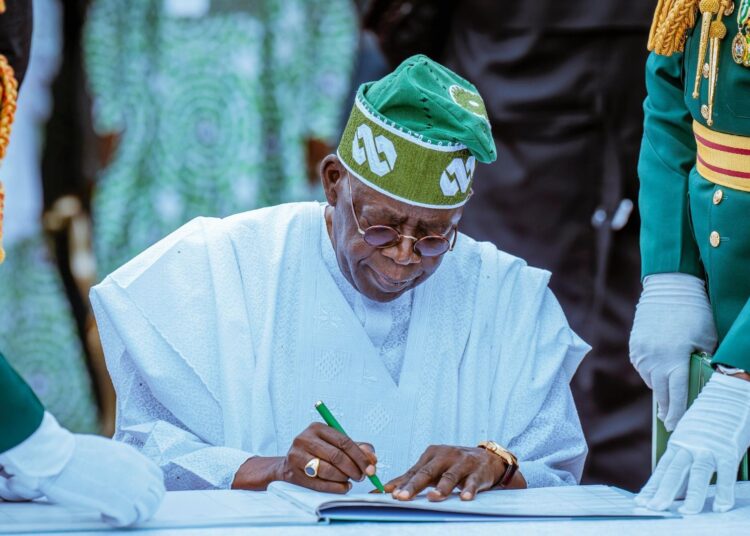The recent protest by contractors under the aegis of the All-Indigenous Contractors Association of Nigeria (AICAN) has once again underscored the need for the government to keep its contractual obligations. AICAN claimed that the federal government owed its members N4 trillion for completed and verified projects.
AICAN’s president, Jackson Nwosu, faulted the government’s claims that payments for the 2024 capital projects had been made and claimed only about one per cent of indigenous contractors had received funds.
The contractors noted that payment for 2,024 capital projects, duly completed and verified by the federal government, had not been made and insisted that, contrary to the government’s claims that all payments had been settled, many contractors were owed.
However, the funding squeeze impacts millions of Nigerians, including the Nigerian economy, and not only the contractors who are owed.
Denying contractors payment after the work is done and verified does not portray the government well. The government has created the impression that it should not be trusted for business. This is what the long delay in paying contractors suggests.
Essentially, the government’s delay in paying contractors is a disincentive to most businessmen, especially those who, against all the odds, have committed resources to some critical national projects.
But most importantly, it shows the government acting in ways that, when the overall implications of this delay are considered, are capable of crippling these contractors and stagnating the nation’s economy.
Most contractors borrow money from banks and other sources at high interest rates. They must service the interest on the loans and bonds they enter into to execute and complete the projects.
The delay meant that the loan continued to accumulate interest, and they are likely to lose a significant chunk of what ordinarily would have been their profit. If this is not a subtle way of taking them off the business scene, then nothing is.
It is sad that, like the contractors said, some died while waiting for the payment. Some businesses have gone bankrupt, and some workers have been sacked. The overall implication is that in an economy where unemployment is high with attendant consequences on crime and other social vices, the government, through its deliberate act of owing contractors, contributes to increased job losses.
There are concerns that the delay is caused by the centralisation of the payment procedures of the local contractors by the office of the Accountant General of the Federation (AGF). Something is fundamentally wrong with this new policy of centralising payment. The government needs to decentralise payment now to ensure seamless payments to contractors.
We find it difficult to explain why, as the biggest spender in this economy, the government elected to owe contractors this much for this long. Amid this long delay, or maybe deliberate refusal to pay contractors, the government said it exceeded its revenue target by generating over N20 trillion in eight months. Is there any reason why a government that generated this much cannot settle its contractual obligations?
Like most Nigerians, we are tempted to believe that the nation has spending, not revenue problems since contractors are owed. Nigerian embassies in different countries are starved of funds to the extent that rents, staff salaries and payment for services rendered by some service providers are owed. Ministries, departments, and agencies are starved of capital expenditure funds. There is one plausible conclusion to make from this: we have, like most Nigerians have said repeatedly, a spending problem.
The present administration’s efforts to increase external reserves will make sense to an average Nigerian and ultimately have a greater impact when there is a boost in the purchasing power of the citizens, which in itself is the best way to measure the growth in the nation’s Gross Domestic Product (GDP).
Perhaps it is right to remind the government that its spending has a far-reaching impact on the economy, including boosting aggregate demand and enabling businesses to expand and employ more staff.
Despite admitting that it recorded improved revenue generation, the government’s delay in paying contractors showed that their payment is not seen as a priority. Otherwise, why deny them payment when there is a remarkable boost in revenue generation? No corporate entity or country likes dealing with a nation that does not meet its contractual obligations. The Government must settle all liabilities owed to contractors now.
It is becoming convenient to speculate that the other angle to this delay in paying the contractors may have everything to do with the 2027 general election, which is beginning to look like a do-or-die affair between the ruling All Progressives Congress (APC) and the opposition. The government, it seems, needs some loose cash to play around with as it pursues its reelection ambition.
We are persuaded to urge the government to reflate the economy and ease the stress in the polity. We are convinced that paying the contractors will benefit all sectors of the economy in more ways than one. The earlier the better.





